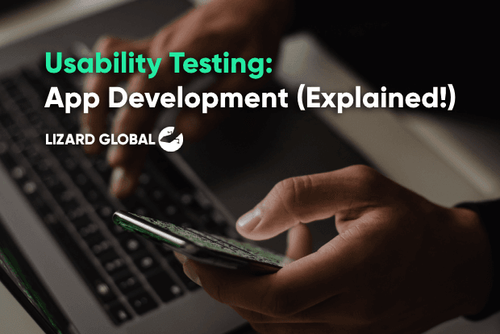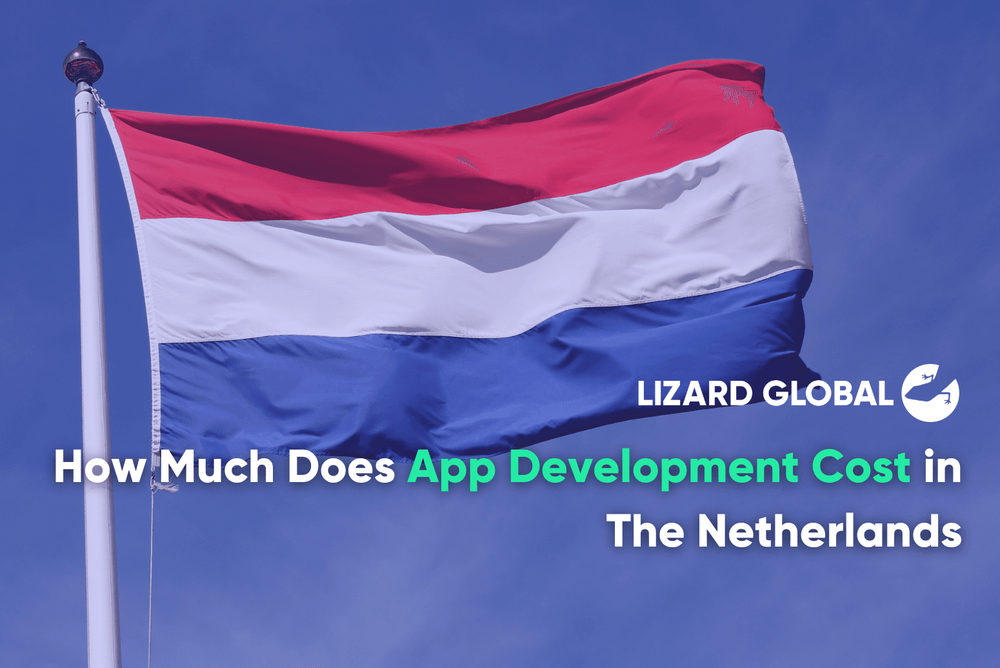Digital Transformations in the Government and Public Sector
Get the latest updates about our blog posts.
Subscribe so you don’t miss out!
Digital transformations are happening all around us, no matter the industry or sector. Right now, it’s crucial for business owners to stay ahead of the competition by introducing new technologies into their organization and business processes. In order to ensure a successful digital transformation, organizations need to make sure that the technologies they choose are perfectly tailored to their business values, mission, and culture, while at the same time transforming these assets to fit these newly adopted technologies.
In our blog series about the digital transformation of different industries, we highlight the most important technological changes within a specific sector. This week, we dive into the governmental industry and the public sector to find out how technology has impacted businesses within this industry.
Technology in the government and public sector
Governmental agencies all around the world are implementing digital transformation projects and initiatives for a variety of reasons, including citizen satisfaction and overall cost savings. These changes take place at various levels of governmental influence: national, regional, local, and supranational. They also occur in public sector services closely managed by governments, such as public transportation/mobility, healthcare, and in regulated, semi-regulated, or state-sponsored services.
In order to understand how technologies are transforming the governmental sector, we need to take a closer look at how this industry has transformed so far. From early e-government attempts during the dot-com era to the user-experience-driven creation of government digital service units and the adoption of commercial IT techniques, many governments have made significant digital advancements over the last two decades. But although governments became connected and wired, their transformation has not been truly revolutionary. Many institutions are still focusing on digitizing front-end services while putting off the more difficult task of completely reengineering government operations, processes, and systems.
Challenges
One of the most difficult parts of a digital transformation is the perfect alignment of the technologies and existing processes. After all, the longer a specific process has been running, the more difficult it will be to migrate it into a digitized process. Not only does the process itself need to change, the people within that process must also be ready to adopt the new technologies and the changes these technologies bring with them. The public sector and governmental institutions often struggle tremendously with the implementation of new technologies into current business processes. Here’s why:
- In general, governmental organizations have a limited budget for investing in the types of technologies that ensure a successful transition. And without promising data on the benefits of these technologies, it can be difficult to make a case for such an investment.
- Strict governmental regulations and laws can limit the ability to implement new technologies in current processes and methods, as they can have a (temporary) impact on the handling of user data.
- When it comes to process or product development, cybersecurity considerations require rigorous (and often tedious) scrutiny.
- A lot of organizations in the public sector are connected to each other in some way. This means that, if one organization decides to digitize its business processes, the other needs to do so in order to sustain its level of collaboration and information exchange.
Do you need help with finding the right technologies for the digital transformation of your organization and business processes? Ask our experts! Reach out at hello@lizard.global and we’ll be right with you
Benefits & examples
Generally, the public sector and governments can gain a tremendous amount from a digital transformation. Here are some ways digitization of processes and services can positively affect governmental organizations and their customers:
- Enhanced transparency and efficiency
- Optimized provision of services
- Lowered operational costs
- Improved trust and overall customer satisfaction
- Safer storage and management of user data
While the public sector still has a lot of challenges with streamlining digital innovations and transformations, there are also a lot of success cases to highlight.
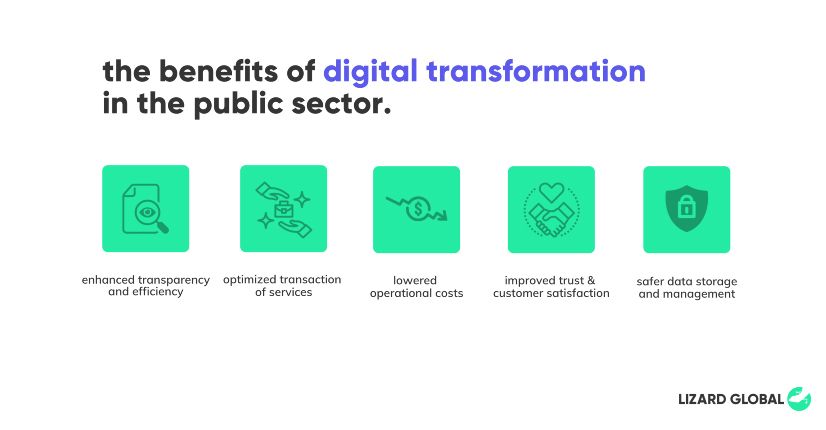
Optimized digital platforms
By merging their digital channels, governments can provide a consistent user experience. Within one centralized platform, users can navigate and receive information and services based on their needs rather than losing track of multiple apps, websites, and other sources. Using the same solution for repeated service transactions, such as identification or payment, makes the process more familiar to users and encourages widespread adoption of the solution. Furthermore, a consistent look and feel across a government's digital brand helps to boost trust in the government's brand, which is essential for businesses within this industry, handling sensitive user information on a daily basis.
Process automation
AI-assisted process automation improves accuracy, speed, and efficiency for low-level, high-volume, time-consuming operations. It also reduces waste from paper-based document creation and storage, and it allows for the staff to focus on more critical public services that still heavily rely on human interference. Next to that, automation and centralized data storage easily connect with advanced cybersecurity and encryption solutions like blockchain to ensure every transaction is correct, properly recorded, and audit-ready, while eliminating rogue expenditure. With process automation, business- and decision-making processes such as contract signing and budget expenditures within governmental institutions become more transparent, which can greatly improve the customer experience and overall trust between the government and citizens.
Data storage and analytics
Data analytics in digital data dashboards provide continuous insight into the data that matters. This data can provide information on how to improve public sector services to fit the needs of the people at all times. Next to data analytics, data collection and storage in general also play a crucial role in public sector services.Project: GWAP
In many regions, cash is still the preferred means of payment. This puts a major dependency on how you carry cash (bills and coins), which could make payments more difficult and expose you to the risk of theft. This is partly due to the fact that certain countries' financial infrastructure is not yet ready for the shift to digital payments. In Suriname, this problem resulted in the development of GWAP: a digital solution that facilitates payments for small and medium-sized services and products while also assisting people in the adoption of a digital customer-centric payment system.
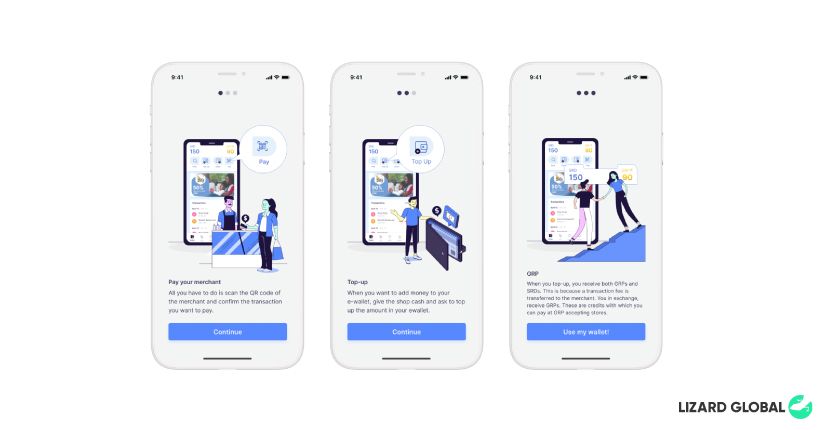
GWAP was developed to make online payments easier in countries with a limited digital payment infrastructure, where a major portion of the population still pays for products and services with cash. People can use the mobile app to have a better understanding of their transactions and make secure online money transfers.
Project: ACTNow
In order to make life in cities run smoothly, municipalities need to be able to react swiftly to any issue that arises. Issues within the neighborhood, such as holes in the road, construction issues or unlicensed business can have a tremendous civil impact. Such issues call for quick action in the form of a simple tool that makes it easier for citizens to report issues on the one hand, and easier for municipalities to oversee and respond to them was our goal. All of this in one app that is easy to use, shows effective results and has a positive impact on society.
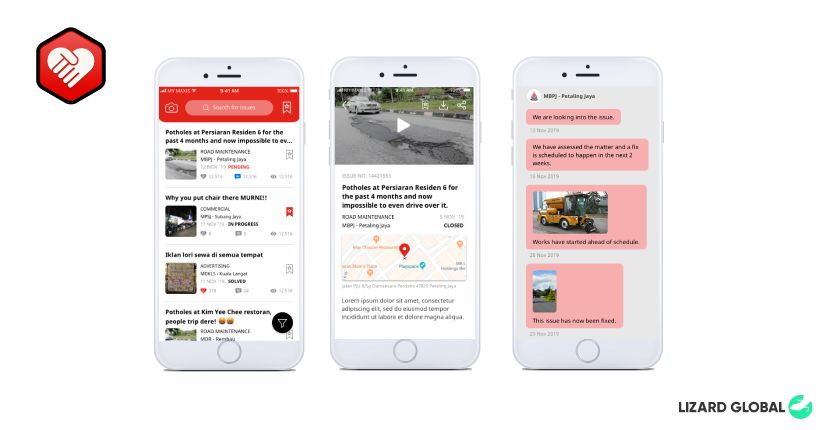
Lizard Global partnered up with three passionate and ambitious entrepreneurs to create the ActNow platform, which is now utilized across Malaysia to link citizens and local governments. To encourage users to use the app, issue reporting can be done anonymously. All reported issues are vetted based on their relevance and verified to ensure that they are legal. Users can save reports that are of interest to them as bookmarks to keep track of their progress. Since its launch, the app has eased legal processes, and with features like fast-tracking and location-sharing of users when filing reports, efficiency is only likely to grow over time.
Digitally transform with Lizard Global
Undertaking the digital transformation journey requires a thorough understanding of your business’ competencies as well as a vision for the future that will decide how internal processes, your organizational structure, and adopted technologies will need to evolve. The modern age's tools, techniques, technologies, and ideas give us more options than ever before to assist governmental institutes to better understand the needs of civilians. We guide them through the process of digitally enhancing their services by data analysis and process automation in order to provide the best possible services.
No matter what industry you’re active in, we believe that technology can help any business in growing a bigger and more loyal customer base. As the step towards a digital transformation can be challenging, we gladly guide you through the process. Not only do our experts know exactly what technologies are suited for the digital transformation of your business and its unique character, but they can also make and implement your solution in such a way that it’s scalable and ready for a future of growth and success.
Are you looking for a digital partner for the development of your web app or mobile application, and are you ready to take the step towards the digital transformation of your own business and industry? We can help! Get in touch with our experts by filling out the contact form on our website, or drop us a line on WhatsApp or our social media channels.
Curious about our other verticals? Check out our portfolio for an insight into all the industries we’re supporting with digital solutions. Or take a look at our previous blogs on the digital transformation in:
Maritime
Healthcare
FinTech
Human Resources
Education
Community
Transport & logistics
Industry 4.0
Real Estate
Sports


